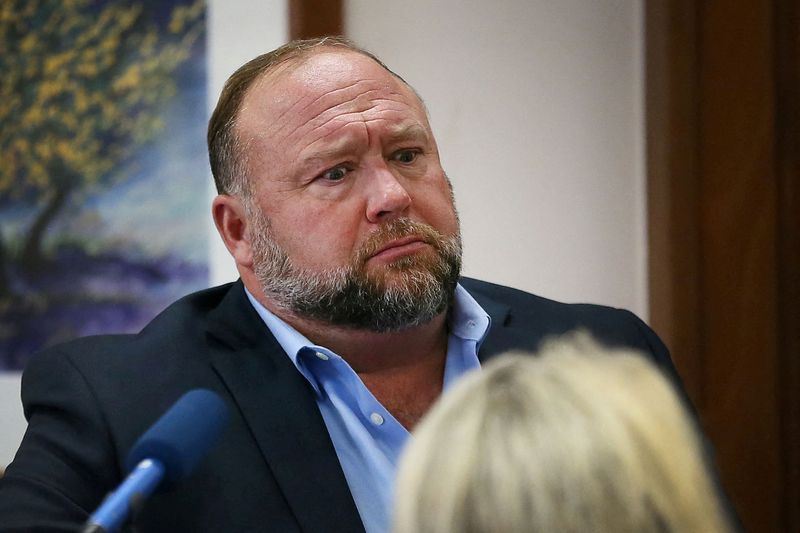Alex Jones may have lied in court, but perjury charge would be unusual
2022.08.06 00:06

Alex Jones attempts to answer questions about his emails asked by Mark Bankston, lawyer for Neil Heslin and Scarlett Lewis, during trial at the Travis County Courthouse, Austin, Texas, U.S., August 3, 2022. Briana Sanchez/Pool via REUTERS
By Daniel Wiessner
(Reuters) – Revelations that conspiracy theorist Alex Jones may have lied on the stand in a defamation lawsuit by parents of a child slain in the 2012 Sandy Hook mass shooting made for a dramatic moment in a high-profile trial, but it would be unusual for prosecutors to follow through with perjury charges, lawyers said.
A jury in Austin, Texas, on Thursday said Jones should pay $4.1 million to the plaintiffs for falsely claiming the shooting was a hoax. The jury began deliberating on Friday on how much Jones should pay in punitive damages.
During the final day of testimony on Wednesday, a lawyer for the parents made the unusual disclosure that Jones’ lawyer had inadvertently sent him a file containing text messages from Jones’ phone about the Sandy Hook shooting.
The revelation was significant because Jones has maintained that he had searched his phone for such messages and never found any.
The lawyer for the parents, Mark Bankston, in questioning Jones about the texts, asked him if he knew the definition of perjury.
Jones replied that the suggestion he had lied was “ridiculous.”
Travis County Judge Maya Guerra Gamble on Thursday denied Jones’ motion for a mistrial based on the disclosure.
Perjury charges are rare in Texas, even when parties in civil lawsuits are caught giving false testimony, according to criminal defense lawyers who practice in the state.
But prosecutors in liberal Travis County, where Jones’ radio show and right-wing webcast InfoWars is based, could be more inclined to charge Jones because of his incendiary conservative views and his mockery of the legal system during the defamation case, said Lisa Shapiro Strauss, a lawyer in Houston.
“The political motivation may be there to make an example of him,” Strauss said.
Lawyers for Jones and the family that sued him, and the Travis County District Attorney’s office, did not respond to requests for comment.
If Jones were charged it would likely be for aggravated perjury, a felony punishable by two 10 years in prison, because his comments were made in court testimony, lawyers said. Lying under oath outside of court, such as in a deposition or police statement, is a misdemeanor in Texas.
Prosecutors would have to closely review Jones’ testimony about the text messages before deciding whether to bring a perjury charge, according to Benson Varghese, a Fort Worth, Texas-based defense lawyer.
Varghese said that if Jones has claimed only that he could not find the messages, prosecutors could have a difficult time proving that he intentionally lied about their existence.
“The mere fact that the text messages exist does not necessarily mean he found them” and then lied about it, Varghese said.
Gamble, the judge presiding over the defamation case, can refer the matter to local prosecutors, which would likely raise the chances that Jones is charged, lawyers said.
Gamble has repeatedly admonished Jones and his legal team during four years of litigation in the case and has suggested that Jones lied under oath about complying with discovery requests and his company’s financial situation.
Earlier this week, the judge warned Jones against lying on the stand, telling him, “Just because you claim to think something is true does not make it true.”
But Gamble has refrained from imposing sanctions on Jones in the defamation case, suggesting his statements may be insufficiently serious to warrant perjury charges, said Nick Bunch, a white-collar defense lawyer in Dallas.
“It’s very unlikely that it turns into a criminal prosecution,” Bunch said.








